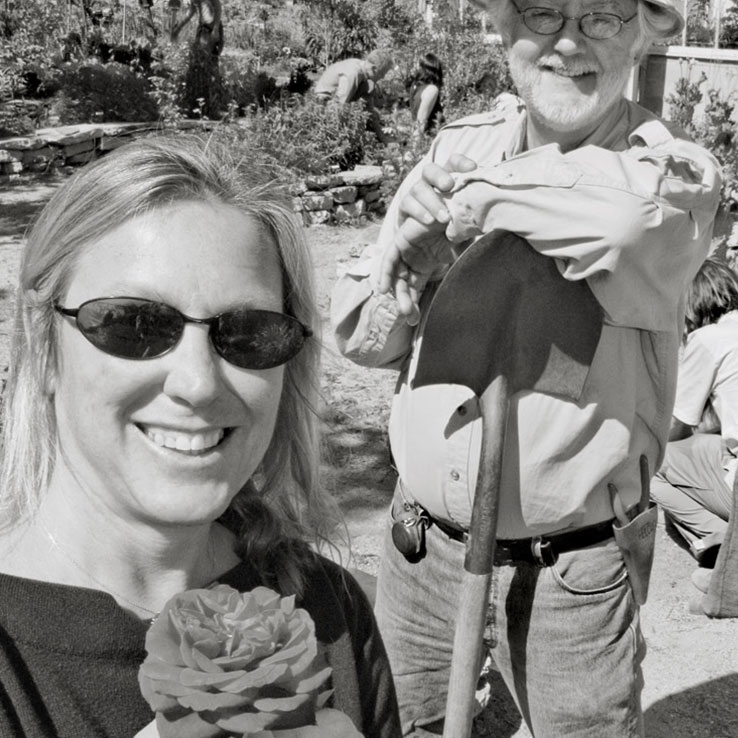The Learning Garden was established on the grounds of Venice High School in 2001, transforming a 60,000-square-foot plot of neglected land into a community resource. On any given day, the Learning Garden brings together high school students studying horticulture, cooking, or environmental science, Yo San University students growing traditional Chinese medicinal herbs, community members harvesting organic basil, beans, and vegetables, and local tai chi enthusiasts practicing their movements in the peaceful surroundings. The Learning Garden has taken the concept of the school-based garden to a new level: one that attracts participation from gardeners, scholars, and local residents as well as teachers and students.
Mentorship Profile
Co-Founder and Executive Director: Julie Mann
Mentor: Patti Giggans, Executive Director, Peace Over Violence
Julie Mann and Patti Giggans meet at 8:00 a.m. twice a month to discuss The Learning Garden, a peaceful oasis in a busy part of the city where students, teachers, community members, master gardeners, and visitors come together to learn and cultivate. The meetings are convenient for Patti, who lives nearby and stops in before she begins her day at her office in Downtown LA. Julie set up this meeting structure because, first, she is a morning person, and second, she is aware about what she needs from a mentor.
“I need deadlines! If I don’t have that push, I can put off the things that I know I need to do, but that are easy to postpone. Patti gives me assignments, like writing an end-of-the-year contribution letter or a list of grants to apply for, and I know that I have to get them done in two weeks,” said Julie, co-founder and Executive Director of The Learning Garden. “Patti has been a real influence in making things happen; she is action-oriented.”
Patti, a longtime leader on domestic violence and Executive Director at Peace Over Violence for over 25 years, enjoys thinking, talking and problem-solving with Julie.
“It’s provocative to reflect on life cycles of nonprofit organizations. It renews my thinking about what I’m doing at my job when I give advice to Julie about how she should handle a situation at the Learning Garden,” said Patti. “Sometimes, it’s just a matter of the perspective that I bring from being in the field for so long. Recently, Julie told me about a situation she was having with a volunteer. I told her that it was a common type of problem and one that needed to be nipped in the bud. She had good instincts about how to handle it, and I could validate her instincts and support her plan of action.”
Patti finds that, working with the Learning Garden, she lapses into gardening metaphors when giving advice. In that spirit, she describes the mentor relationship as “fruitful.”
“I remember when I started out in community work, I tried to find information from all kinds of sources. But this mentor connection is different. We’ve been meeting twice a week for two years now, so we have built trust. There are a lot of opportunities to receive technical assistance for a nonprofit, but a structured, trust relationship like this is different. I can support Julie in a consistent and intimate way,” said Patti. This intimacy works for Julie, too.
“Patti shares her issues with me, and lets me learn from mistakes that she made in the past. I can learn about problems that I may encounter three years down the road, and learn how to head them off,” said Julie.
“When you think about it,” said Patti, “we spend more time at work and in our professional relationships than we do at home. It’s important to be intimate, collegial, and authentic in your professional relationships because they are a significant part of life.”
